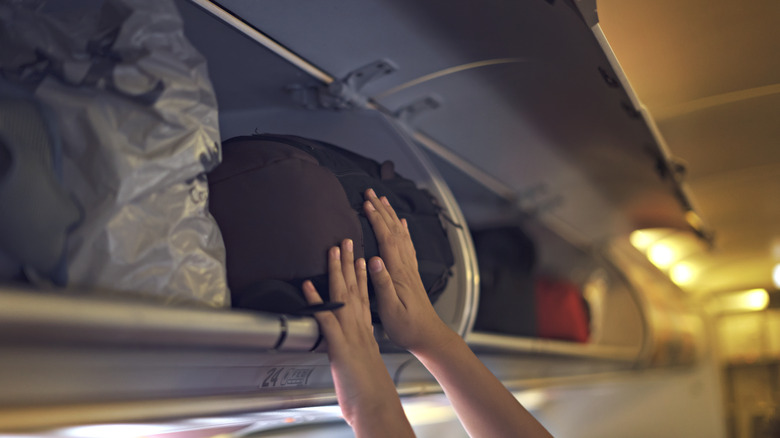You Don't Have To Pack Clothes When Traveling With This One Airline
Some of the top concerns travelers have when headed overseas are often related to their luggage. However, the new clothing rental program offered by Japan Airlines (JAL) is set to revolutionize how passengers travel. Whether you regularly deal with overpacking woes, or you worry about going over the airline's weight limit, your environmental impact, or you just don't want to drag a big piece of luggage around, this might be just the thing you never knew you needed.
Through August 2024, JAL will be testing its new clothing rental initiative — called "Any Wear, Anywhere" — with passengers flying on JAL-operated flights. The program is intended to lower the total weight aboard aircraft in an effort to reduce the amount of emissions produced by air travel. This is because the weight of an airplane impacts how much jet fuel is burned and, therefore, how much CO2 is released into the air.
In fact, for every 10 kilograms (22 lbs) of extra weight brought onto a flight from New York to Tokyo, the airplane releases 7.5 kilograms (16.5 lbs) pounds of carbon emissions. It takes the same amount of emissions to create one paperback book or a bacon cheeseburger with fries. While that might not seem like a lot, it very literally adds up with pound after pound of extra weight that one passenger can bring in their luggage. With this new initiative, JAL wants to change all of that and simultaneously make flying more sustainable and easier for its passengers. Here's how it works.
JAL's clothing rental service could change the way we fly
JAL's Any Wear, Anywhere service is set to change how passengers pack and travel to visit Japan. Once passengers book their flights, they can then go to the Any Wear website and book their rental clothing one month in advance for their trip using their JAL Reference Number and the address of wherever they're staying, including an Airbnb (as long as you contact your host in advance).
Once the reservation and payment are completed, you'll fly to Japan (hopefully with less baggage), and collect your clothing from your hotel concierge or your host. You can use the clothes to your heart's content for up to two weeks and then simply return them to the hotel concierge or your host to have them returned. If you'll be departing from a different hotel than the one you arrived at, you'll simply note the hotel's address in the "Add order note" section when making your reservation.
One of the best parts about the service is that shipping is included in the price, which is an incredible offer considering the cost to rent is only between ¥4,000 to ¥7,000 (about $25 to $50 dollars or £20 to £40 pounds). There are, however, some additional charges if you lose or damage clothing or keep it longer than the two allotted weeks.
Drawbacks to JAL's clothing rental service
JAL's clothing rental service has numerous perks. However, there are a few downsides that may dissuade or entirely exclude passengers from trying it out. The first issue you can spot immediately is the lack of inclusive sizing. If you know anything about Japan, this may not come as a surprise as sizes generally run smaller there. While you can choose between sizes Small to XL, when you check their sizing chart, the weight and height references for their sizes only go up to 176 pounds and 5'7" for women and 198 pounds and 6'2" for men. To make matters worse, when you click on their collections, the L and XL sizes are not even available half the time.
We'll throw them a bone and say that the sizing options are probably limited since this is a brand-new initiative. However, it's not a great start for a program that is, assumedly, targeting Westerners from the U.S. and Europe who are, on average, a bit taller and larger than the available sizing.
Additionally, while the pricing is shockingly accessible, we would almost rather see more variety at a higher quality and pay a bit more with options to extend the rental past two weeks. After all, passengers who are flying to Japan may be spending more than two weeks in the country.


